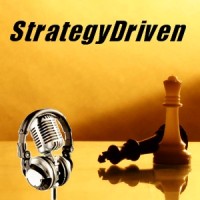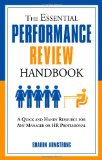StrategyDriven Podcast Special Edition 45 – An Interview with Sharon Armstrong, author of The Essential Performance Review Handbook

Special Edition 45 – An Interview with Sharon Armstrong, author of The Essential Performance Review Handbook explores how to conduct personnel performance reviews that are a positive experience for employees and that helps them and the organization excel. During our discussion, Sharon Armstrong, author of The Essential Performance Review Handbook: A Quick and Handy Resource For Any Manager or HR Professional and Founder of Sharon Armstrong and Associates, shares with us her insights and illustrative examples regarding:
what is at the heart of manager and employee anxiety over personnel performance reviews
- why some managers and employees approach the performance review process with a high degree of cynicism
- key principles and methods managers and employees should practice when preparing, executing, and following-up on performance reviews
- the most effective periodicity for conducting performance reviews
- how executives and managers can ensure performance ratings are consistently defined and applied
Additional Information
In addition to the outstanding insights Sharon shares in The Essential Performance Review Handbook and this special edition podcast are the resources accessible from her websites, www.SharonArmstrongAndAssociates.com and www.TheEssentialPerformanceReviewHandbook.com. Sharon’s book, The Essential Performance Review Handbook
, can be purchased by clicking here
.
About the Author

and The Essential HR Handbook
, is the Founder of Sharon Armstrong and Associates. Sharon has served as director of human resources at a law firm and several other organizations in Washington, DC. Since launching her own consulting business in 1998, she has provided training and completed HR projects dealing with performance management design and implementation for a wide variety of clients. To read Sharon’s complete biography, click here.
Podcast: Play in new window | Download (Duration: 30:41 — 42.2MB)
Subscribe: RSS


 Ed has worked in more than 40 countries with organizations including Booz Allen Hamilton, Satyam, Seer Technologies, National Australia Bank, Larson & Toubro and the World Economic Forum. He is the only Chief Learning Officer to lead two companies to ASTD BEST Award #1 ranking; Booz Allen Hamilton and Satyam Computer Services (only company outside United States to achieve this).
Ed has worked in more than 40 countries with organizations including Booz Allen Hamilton, Satyam, Seer Technologies, National Australia Bank, Larson & Toubro and the World Economic Forum. He is the only Chief Learning Officer to lead two companies to ASTD BEST Award #1 ranking; Booz Allen Hamilton and Satyam Computer Services (only company outside United States to achieve this). Pris has 30 years of experience with Fortune 500 companies around the world. She has received international acclaim for her work in global leadership development, diversity and executive coaching.
Pris has 30 years of experience with Fortune 500 companies around the world. She has received international acclaim for her work in global leadership development, diversity and executive coaching. Stuart L. Hart, author of
Stuart L. Hart, author of